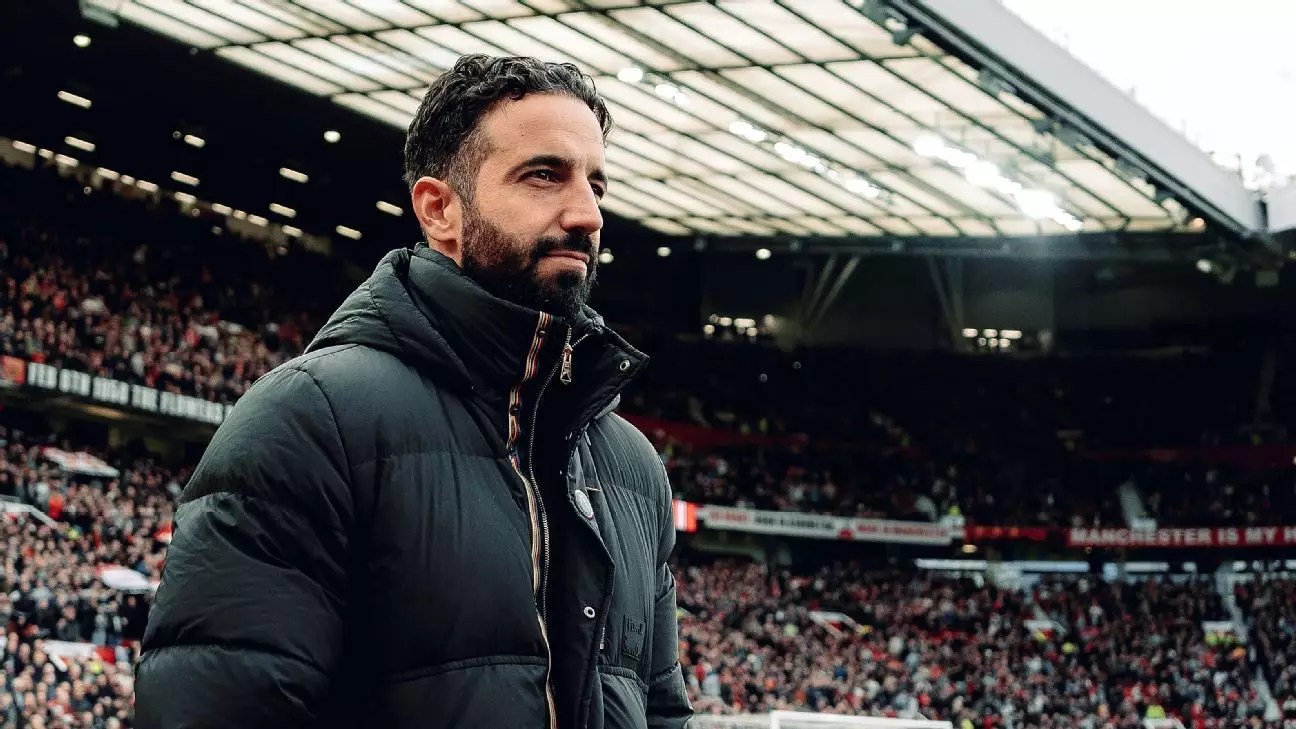When Ruben Amorim made his debut visit to Manchester United’s Carrington training ground, it felt like a new beginning under a glowing November sun, a stark contrast to what the typically dreary weather would suggest. His enthusiasm was palpable, stemming from a bright smile as he stepped out of his sleek black Mercedes after arriving from Manchester Airport. This first impression, fleeting as it may have been with the season’s change, was emblematic of the initial optimism surrounding his appointment as head coach. However, just two weeks later, the glow of his arrival faded as he faced a deluge of challenges that come hand-in-hand with coaching a historic club like United.
As Amorim stood at the podium during his inaugural press conference, the gloomy weather mirrored the mounting pressures that awaited him on the touchlines. His coaching tenure was abruptly overshadowed by the unexpected departure of key figures in the club’s hierarchy. The exit of sporting director Dan Ashworth, just five months into his role, was a clear indication of instability in United’s operations, and it came packaged along with a PR nightmare involving the club’s stance on the Premier League’s LGBTQ+ initiative. As if that weren’t enough, rising ticket prices introduced by Sir Jim Ratcliffe only added to the unrest among fans. Amorim’s early days, rather than embodying brightness, quickly delved into a tempest of discontent, underlining the stark contrast between his aspirations and the harsh reality.
Navigating through such a tumultuous environment is no small feat, especially for a coach who has parachuted into the role midseason. With an arduous fixture list looming on the horizon—nine matches across various competitions in December alone—the timeline for making substantial changes to the underperforming squad is dangerously tight. What is perhaps the most striking observation is Amorim’s commitment to maximizing training sessions under limited circumstances. Unlike predecessors who favored routine methods, he employs tactical walk-throughs, insisting on involvement even for those who may appear on the margins. His hands-on yet collective approach in training aims to foster not only skill but camaraderie as the squad navigates through a challenging phase.
Creating a Unified Team Culture
In a sport rife with individual accolades, Amorim emphasizes unity. His strategy aligns closely with a notion that if players opt out of collective initiatives, the team suffers as a whole. This ideology was put into practice when the squad decided against wearing LGBTQ+ jackets, highlighting personal beliefs within the broader context of team coherence. In recent discourse with the media, Amorim has vocally supported his players, expressing an unwavering belief in their potential—an approach that contrasts sharply with the previous management style which often felt detached from the squad.
Further showcasing his unique methodologies, Amorim chooses not to conduct traditional post-match talks. Instead, he gives players the freedom to reflect on their performances and convene a debrief among themselves. This modern approach not only acknowledges the emotional aftermath of games but also promotes inclusive dialogue. Add to this the integrated training culture, where returning players are celebrated in a light-hearted manner, and it becomes clear that Amorim prioritizes team spirit as the foundation for success.
Despite cultivating an endearing rapport with his players, Amorim does not shy away from being a strict manager. His disappointment at a player not being ready to substitute captures his drive for efficiency and discipline. Fresh rules, such as a ban on food in the dressing room during match days, might seem trivial, but they reflect a broader philosophy of professionalism that he is keen to instill.
Moving forward, balancing his nascent managerial approach with the overwhelming demands of the Premier League encapsulates the precarious nature of his current tenure. With family commitments looming back home in Portugal—as he awaits to settle in Manchester—there is an undeniable strain that comes with pressing responsibilities. He plans to spend significant part of the Christmas schedule working while others around him celebrate, proving motivating but also poignant as he forges ahead in his adaptation to one of football’s most iconic settings.
In his first month in this high-pressure role, Amorim has demonstrated an unwavering determination to transcend immediate challenges while laying the groundwork for long-term success. The road ahead is undoubtedly steep, illuminated by harsh realities that test his resolve. Yet, as he navigates the complexities of Manchester United, the potential for growth—both personally and within the squad—is tangible. In the face of adversity, Amorim seems committed to building a team culture steeped in trust, belief, and unity, a feat that may very well determine his legacy at this storied club. The first month may have revealed the storm, but it is how he chooses to steer through it that will define Ruben Amorim’s chapter at Manchester United.


Leave a Reply